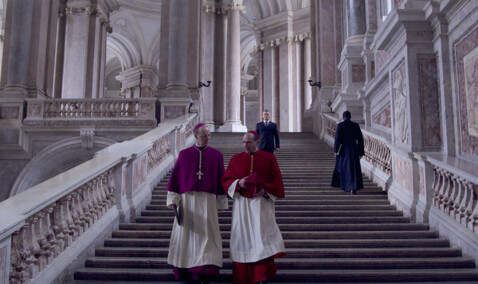I'm Not There Germany, USA 2007 – 135min.
Press text
I'm Not There
I'm Not There is an unconventional journey into the life and times of Bob Dylan. Six actors portray Dylan as a series of shifting personae-from thepublic to the private to the fantastical-weaving together a rich and colorfulportrait of this ever-elusive American icon.
Poet, prophet, outlaw, fake, star of electricity, rock and roll martyr, bornagain Christian-seven identities braided together, seven organs pumpingthrough one life story, as dense and vibrant as the era it inspired.
ARTHURArthur (Ben Wishaw), a renegade symbolist poet, serves as the film's de factonarrator, while being interrogated by a nameless commission as to the motivations, subversive undercurrents, and political misreading of his work. Arthur represents Dylan under the influence of Arthur Rimbaud as symbolist poet and artistic rebel. Here, Arthur responds in quotes from Dylan's famous 1965 interviews and his witty, ironic responses provide counterpoint to the chapters in a life that begin to unfurl.
WOODYFirst up, as an embodiment of Dylan's youthful aspirations, we meet Woody (Marcus Carl Franklin), a precocious train-hopper who, despite being 11-years old and black, calls himself Woody Guthrie. Set in 1959, Woody has adopted theposture and tales of the dust bowl troubadour with a calculated earnestness. Tothe supporters he encounters on the road, Woody's tall tales of circus escapades and musical glory provide impressive evidence of his authenticity, even as his impersonation is revealed.
JACKThe first character to achieve success, "singing about his own time", is Jack (Christian Bale), who spearheads the protest-music scene of early sixties Greenwich Village with his original compositions, strident performances and high-profile LPs. Jack represents Dylan of the early sixties folk revival as embodied in landmark recordings such as The Freewheelin' Bob Dylan and The Times They Are A-Changin'. As the devouring public divines a social and political consciousness in his lyrics, Jack severs ties with his 'message' in a bizarre retreat from both his lover and folk singing champion, Alice (Julianne Moore) and his young worshiping audience.
ROBBIERobbie (Heath Ledger), a New York actor and motorcycle enthusiast, races tocounter-culture fame with his performance in a 1965 film biography of the nowvanished Jack. Robbie's troubled ten-year relationship with Claire (Charlotte Gainsbourg) is chronicled from their initial meeting in Greenwich Village through to their eventual separation against the background turmoil of the Vietnam War. Here, Dylan's romantic life is chronicled, drawing from his early love songs to Suze Rotolo (from The Freewheelin' Bob Dylan and Another Side of Bob Dylan) and his songs of marriage and break-up with Sarah Loundes (from Blonde on Blonde, Planet Waves and Blood On The Tracks).
JUDEWhile Robbie struggles to balance private life with encroaching fame, Jude (Cate Blanchett) surrenders body and soul to a full-throttle assault on his folk music following. Closely following Dylan's mid-sixties adventures and folk-rock classics, Highway 61 Revisited and Blonde on Blonde, Jude shocks his audience by embracing amplified rock and an increasingly nihilistic, amphetamine-fuelled persona. His new sound attracts artistic kudos from Allen Ginsberg (David Cross), underground ingénue Coco Rivington (Michelle Williams) and international fame, but infuriates the protest-music old guard, not to mention journalists like Mr. Jones (Bruce Greenwood). Evading emotional attachments and basic self-preservation, Jude's dangerous game propels him into existential breakdown.
PASTOR JOHNJude's resurrection comes in the nick of time: Pastor John (Christian Bale) is Jack twenty years later, a born-again Christian preacher who has jettisoned his folk music legacy for the gospel. Pastor John represents Dylan's own conversion to Christianity in the late 70's, and the gospel recordings that he produced and performed from 1979 -1981 (Slow Train Coming, Saved and Shot of Love.)
BILLYFinally, the last and oldest of our characters is discovered in full retreat from the world. Billy (Richard Gere*) imagines Dylan as the fabled outlaw Billy the Kid, after surviving his famous showdown and finding refuge in the metaphoric town of Riddle. But when word of the town's impending demise forces a confrontation with his old nemesis Pat Garrett (a reincarnated Bruce Greenwood), Billy is forced to abandon sanctuary and continue moving on. Here, the story makes reference to Dylan's many exiles from public life throughout his career, including his first retreat to Woodstock 1967 where he recorded The Basement Tapes and John Wesley Harding. The Western genre reflects his continued interest in country music and western themes (from Nashville Skyline and Pat Garrett & Billy The Kid to his Rolling Thunder Revue in 1976), as well as to his lifelong interest in the roots of traditional American music andits folklore.













You have to sign in to submit comments.
Login & Signup